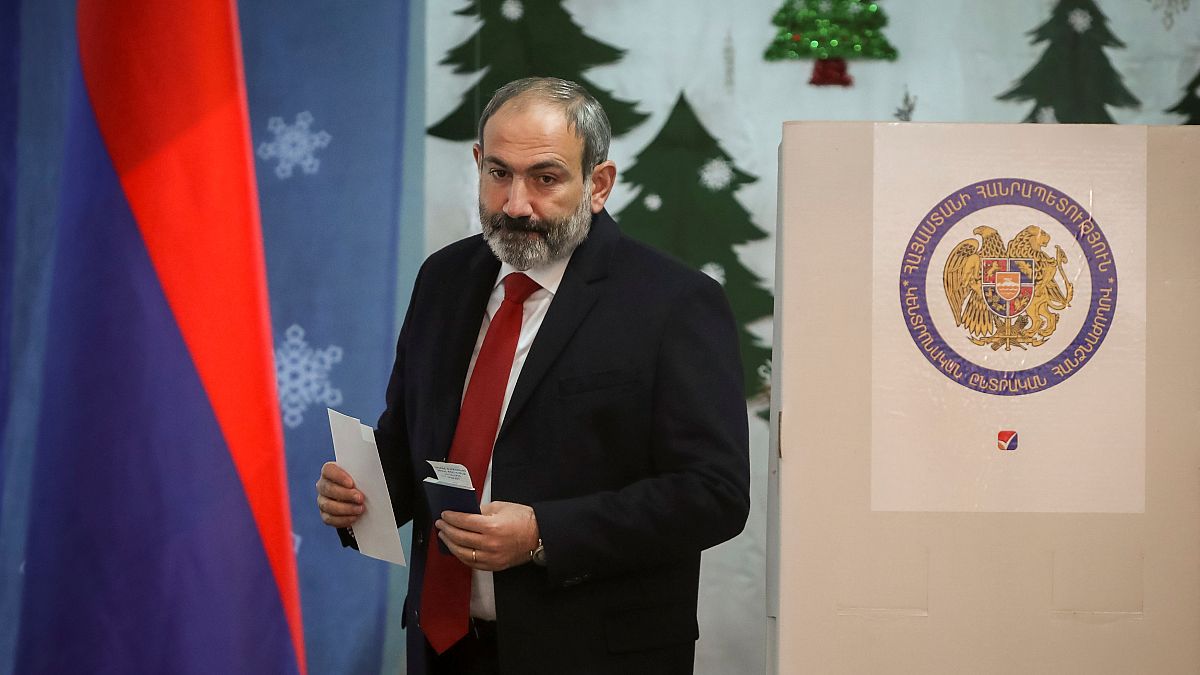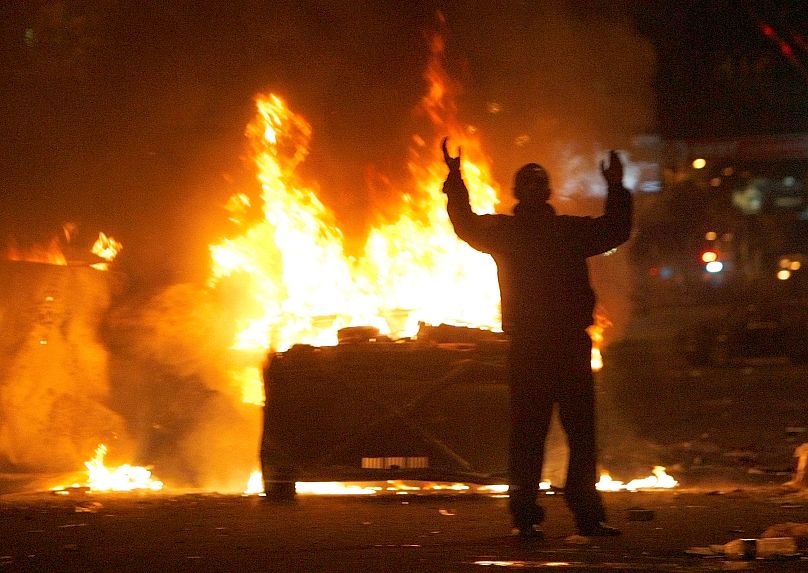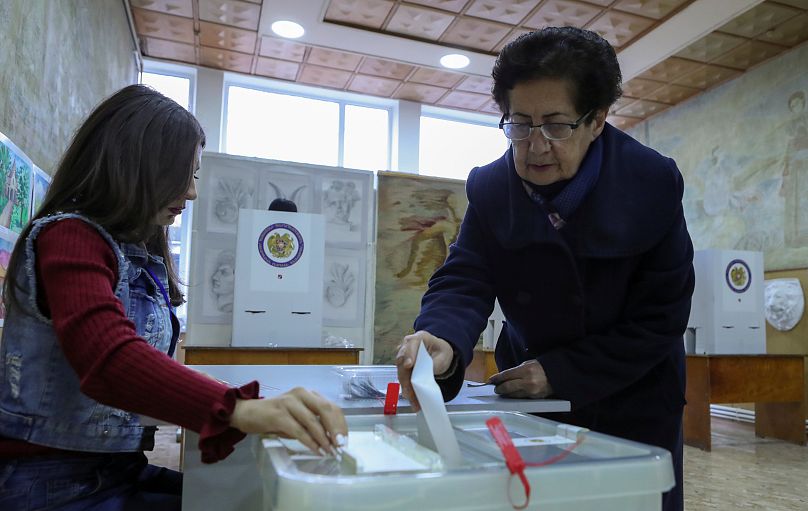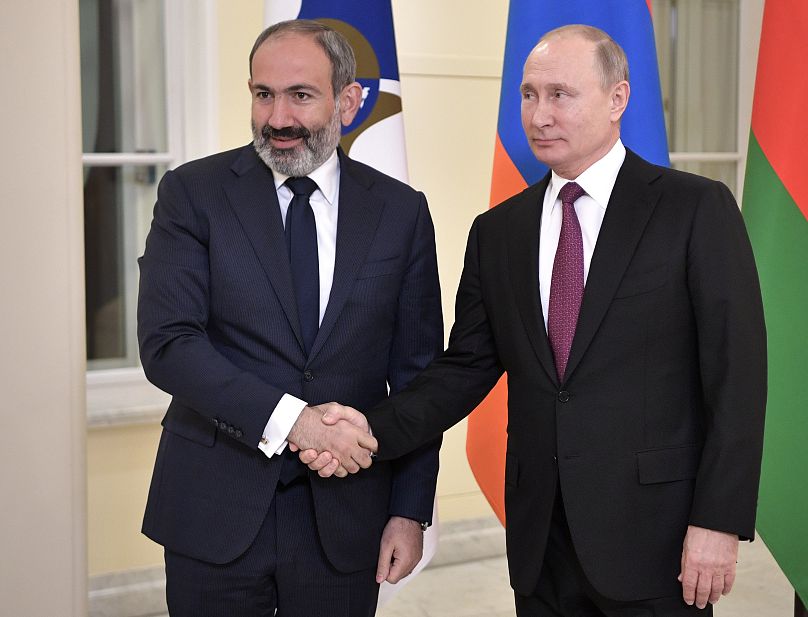Nikol Pashinyan was re-elected as prime minister of Armenia on Sunday in a snap election he called in October in a bid to cement the country's political shift. But who is the man leading change in the country?
Armenia's acting prime minister Nikol Pashinyan won Sunday's snap parliamentary election by a landslide.
He won more than 70% of the vote, the country's election commission said.
Pashinyan, a journalist turned politician, came into power following a peaceful revolution in the country earlier this year.
The mass protests marked a watershed moment in the country — a small post-Soviet landlocked nation of 2.9 million.
At the time of the uprising, a member of parliament, Pashinyan opposed the ruling Republican government and set off his "My Step" protest march on March 31 from Gyumri. Only a few joined him, mainly journalists.
When he reached the capital, Yerevan, on April 13 — thousands more joined.
Faced with an uprising, Prime Minister Serzh Sargsyan resigned on April 23 and Pashinyan was named as acting prime minister shortly after.
"He formed a coalition government which was from the onset promised to be a transition government and its main purpose was to initiate a snap parliamentary election as soon as possible," Anahit Shirinyan, an Armenian political analyst told Euronews.
The parliamentary landscape in Armenia failed to represent Armenian citizens after the revolution, Shirinyan said.
Pashinyan stepped down from his position in October to trigger a snap election held on Sunday, December 9.
Laurence Broers, an associate fellow at the Chatham House think tank's Russia and Eurasia programme said he called the election to "normalise the political situation after 'April's Velvet Revolution.'"
"The revolution brought him to power as prime minister through the force of a civil uprising. But the parliament remained the one elected in April 2017, under the 'old rules,'" Broers said.
Pashinyan's key message in the build-up to the election was to continue in his fight against corruption after several cases were exposed under his leadership.
The leader reopened an investigation into the killing of 10 people during clashes between police and protestors in 2008 and the report claimed the army was used against demonstrators.
Former President Robert Kocharyan was charged on Friday in relation to the investigation of attempting to overthrow constitutional order by a court of appeal - which ordered his detention.
Kocharyan was arrested in July but released a month later and the case was sent to the Armenian appeals court.
How Pashinyan first entered politics
Pashinyan is from the northeastern province of Tavush in Armenia. He is not from an oligarch background, like many former leaders in the country.
Pashinyan worked as a journalist before embarking on a political career and was known for his opposition to the Republican government.
"Many haven't really known him outside of Armenia but those following the country's politics closely will know his profile has been growing over time," Shirinyan said.
"He has been active and he helped form demonstrations and civic activism in the past."
His first major political move came in 2008 when he supported opposition leader Levon Ter-Petrosyan and became a member of his office.
But he was forced underground soon after because there was an order to arrest him, Shirinyan added.
He eventually walked into a police station and turned himself in and spent a short time in prison before being released.
"You can see he has grown politically as a politician over time," Shirinyan said.
Why is Pashinyan so popular in Armenia?
Shirinyan says Armenians hold high expectations on politicians that they believe can solve their problems.
In the rural regions, young people and intellectuals are supporting him, she said.
"For the first time, we have a leader that is intellectually prominent and challenging in different ways. The points he makes, he has good rhetorical skills, he's a journalist and its difficult to challenge him, he is good at debates," Shirinyan said.
Laurence Broers, who is also the co-founder of Caucasus Survey, said the problem Armenia faces is how to convert the so-called 'velvet revolution' into a lasting legacy.
"Pashinyan enjoys high personal popularity, and there is a danger that he sweeps all before him and ends up becoming an overly dominant figure," he said.
"The country desperately needs wide-ranging reforms in many areas, but accountability will also be key to the ultimate effectiveness of reforms. Too often in post-Soviet states, reformist leaders brought to power by popular uprisings have centralised power and lost legitimacy."
What do critics make of Pashinyan's leadership?
Pashinyan's critics can be divided into two camps, Anahit Shirinyan said. The former ruling elite - the Republicans who lost out of the revolution and were disgraced by corruption claims call him a "populist" and claim he is ruining foreign policy.
"Republican critics say Pashinyan's affiliates and team are inexperienced and that he makes contradictions, but not everyone believes the Republicans as they depleted their legitimacy in the revolution," Shirinyan said.
She adds, however, that there are other critics who are seemingly objective in their criticisms of Pashinyan, often calling out his affiliates lack of experience in the governance sector.
"But these are from a more constructive position. They wish him well and kind of want to keep in check. It's easy to lose a sense of reality when you are enjoying such popularity," Shirinyan said.
Pashinyan responds well to these critics, according to Shirinyan, sometimes correcting or explaining his movements in response.
What's at stake?
Republicans held absolute majority up until this election and Armenian law demands there should a stable majority in parliament.
Shirinyan said Pashinyan's majority is finishing touch of the so-called velvet revolution.
Broers, however, pointed to civil uprisings in post-Soviet states of the past that ousted leaders.
"Leaders have had a disappointing record in terms of long-lasting impact and real political change," he said. "Pashinyan brings a young and inexperienced elite into government, mistakes will inevitably be made."
What does Pashinyan's majority mean for Armenia?
A majority means Pashinyan can form a government and progress with his reform.
"Depending on whether the Republican party gets to parliament or not, it will determine a level of political confrontation we're going to have in parliament," Shirinyan said.
But commentators noted a low turnout at the elections — turnout was at 48.63% and many observers were left wondering why. In the country's 2017 election, 60% voted.
"Turnout was low, but not unusually so for democratic regimes and only disappointingly so in the context of previously inflated turnouts in Armenia," said Broers. "The election and the campaign represent a transformational shift from the intimidatory atmosphere of previous elections. The question is what political forces will be able to hold Pashinyan to account and do so in such a way that civilly contested politics is institutionalised as normal."
Shirinyan said Armenia lacks a credible point of comparison for turnout.
"One tool used in the past to rig elections was inflated voter lists. We don't know whether the official voter list is accurate, around 2.5 million voters so we don't know if this has painted an official picture," she said.
Many Armenians are out of the country at any given time with up to a third said to be abroad. In the past, the outside votes were counted on their behalf.
"Multiple votings were seen and transport was organised to take people to vote again in another precinct," Shirinyan said.
Will Russia be watching political developments in Armenia?
Ahead of the vote, Pashinyan said there would no major changes in foreign policy in Armenia and no breaks with Russia.
The country hosts a military base that belongs to Moscow and is part of Russian-led alliances.
But Shirinyan said Russia is suspicious towards Pashinyan because his party has many young Western-education people.
Shirinyan adds that there are no major issues in current Russian-Armenian relations.
Broers said Armenia is set for future political change in overturning former semi-authoritarian and oligarchic regimes.
"How to do that while maintaining the close alliance with Russia will test the Armenian-Russian relationship severely," he said.
"But any dismantling of Armenia's oligarchic ties in many major sectors of the economy, including energy and transport, will inevitably bring Pashinyan into conflict with their deep penetration by Russian state and commercial actors, and their local Armenian clients."



